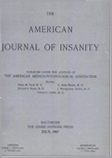RANGE OF PSYCHIATRIC MATERIAL WITHIN THE STATE SCHOOL
Abstract
The cases so briefly cited above represent only a few of the endless variations in personally and character found within the state school. It may be said that clinical study of the mentally defective in state schools reveals one series of psychiatric disorders and the study of patients within the state hospital another series. These series of psychiatric disorders frequently overlap. The psychiatrist in the state school is faced with the necessity of developing large scale or selective group therapy as well as individual therapy for individuals with subnormal intelligence(10). The psychiatrist must deal not only with defects in intelligence but also with defects in conation, feeling, emotion, temperament and character(II). With the familial types, psychiatric therapy has to be directed distinctly along social and eugenical lines in reference to the individual and to the group. With disorders due to specific genetic, metabolic, traumatic or infectional factors, psychiatric therapy must be related more directly toward the individual. Psychiatric therapy for the psychotic defective is often times a matter of hospital attention. Psychotherapy for the psychoneurotic defective, or for the psychopathic defective, may be a matter of institutionalization or of intensive individual attention. Psychotherapy for the behavior disorders of childhood as found in defectives should include formally organized psychiatric or mental hygiene services within both the institution and the community. The large numbers of subnormal individuals within the community-at-large, considered especially in relation to the present-day social pressures, call for increased attention to the psychiatric needs of the subnormal groups—whether within the institution or within the community.
Access content
To read the fulltext, please use one of the options below to sign in or purchase access.- Personal login
- Institutional Login
- Sign in via OpenAthens
- Register for access
-
Please login/register if you wish to pair your device and check access availability.
Not a subscriber?
PsychiatryOnline subscription options offer access to the DSM-5 library, books, journals, CME, and patient resources. This all-in-one virtual library provides psychiatrists and mental health professionals with key resources for diagnosis, treatment, research, and professional development.
Need more help? PsychiatryOnline Customer Service may be reached by emailing [email protected] or by calling 800-368-5777 (in the U.S.) or 703-907-7322 (outside the U.S.).



